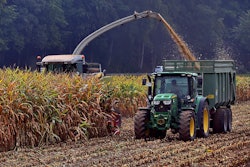
U.S. and Mexico animal feed, grain, poultry and railroad industry associations are raising the alarm about the availability of feed and feed ingredients after two rail bridges in Texas were closed to stem the crossing of migrants at the U.S.-Mexico border.
U.S. border officials closed the international railway crossing bridges in Eagle Pass and El Paso, Texas, on December 18 after detecting a surge in smuggling of migrants through Mexico by train, U.S. Customs and Border Protection (CBP) said. In a statement, CBP said the closures would be temporary but did not say when the crossings would reopen.
“Beginning December 18, 2023, at 8 a.m. local time, CBP’s Office of Field Operations will temporarily suspend operations at the international railway crossing bridges in Eagle Pass and El Paso, Texas, in order to redirect personnel to assist the U.S. Border Patrol with taking migrants into custody,” CBP said in a statement on December 17. “In Eagle Pass, vehicular processing remains suspended at Eagle Pass International Bridge 1. In San Diego, California, San Ysidro’s Pedestrian West operations remain suspended. In Lukeville, Arizona, the Lukeville Port of Entry remains closed.”
In a joint statement issued on December 18, the National Grain and Feed Association (NGFA) and the North American Export Grain Association (NAEGA) called for the immediate reopening of the crossings to allow trains to pass between the U.S. and Mexico.
“The North American market and grain trade supply chain are deeply intertwined,” the statement said. “The closure of these two crossings is impacting the flow of grain and oilseeds for both human and livestock feed to one of the United States’ most important export markets and trading partners.”
According to U.S. Department of Agriculture (USDA) data, rail represents 64% of grain and oilseed exports to Mexico, including 15,565,138 metric tons of grains and oilseeds exported via rail in 2021, and 3.45 metric tons of grains and oilseeds in the third quarter of 2023.
NGFA and NAEGA said they had become aware of “critical tightness in feeding supplies for several livestock feeders in Mexico. We have also learned of grain trains in multiple states being held for shipment due to CBP’s embargo. The critical nature of this issue is growing by the hour, particularly for those livestock feeders that may run short of feed.
“We are deeply concerned by the developing situation and request that CBP work with us, the railroads and other federal partners to develop a commonsense and expedient solution that reopens this critical mode of agricultural transportation for the U.S. and North American markets.”
Mexico’s National Union of Poultry Producers (UNA) also warned of feed shortages due to the closures. About 25% of Mexico’s yellow corn inputs from the U.S., and 63% of its soybean paste imports are moved through the two crossings, the UNA said, adding the closure of the rail bridges could affect the import and timely supply of feed for poultry farmers. UNA also said the shutdown could affect production of chicken and eggs in Mexico.
“We request the support of the Mexican authorities, within the scope of their respective powers, so that they intervene as soon as possible to agree on the reopening of these railway crossings,” the statement said.
Additionally, the Association of American Railroads (AAR) called for reopening of the crossings, which it said serve as “key arteries for the North American rail network.”
“The urgency of reopening these crossings and restoring rail service between the two nations cannot be overstated,” said AAR President and CEO Ian Jefferies in a statement. “There are not separate U.S. and Mexican rail networks; there is only one interconnected North American rail network. Every day the border remains closed unleashes a cascade of delay across operations on both sides of the border, impacting customers and ultimately consumers.”
AAR said Union Pacific and BNSF and their customers are the most immediately and directly affected by the closures.
“Railroads have worked closely with our partners in both the U.S. and Mexican government to create an effective and efficient screening process,” Jefferies said. “As CBP continues to address the exceptionally challenging humanitarian crisis, railroads urge CBP to also safeguard the nation’s supply chain from further disruption.”

















